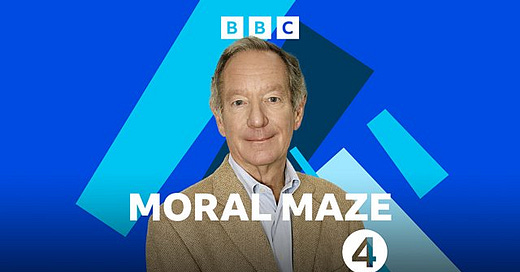The Moral Maze: Who and what is 'toxic'?
Listen to our conversation about coping with "toxic" workplaces on BBC Radio 4

Yesterday, I appeared as an expert “witness” on the BBC Radio 4 program, Moral Maze, in which we were discussing the concept of “toxic” workplaces and relationships. I appear toward the end of the show for 5-10 min talking about “toxicity” from the perspective of Socrates and the Stoics.
In my view, the term “toxicity” h…
Keep reading with a 7-day free trial
Subscribe to Stoicism: Philosophy as a Way of Life to keep reading this post and get 7 days of free access to the full post archives.




